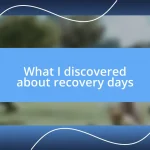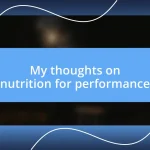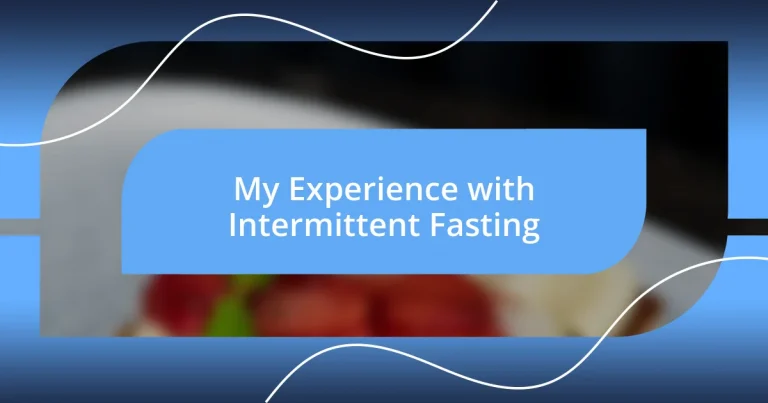Key takeaways:
- Intermittent fasting is a structured eating approach that helps reset the relationship with food, promotes mental clarity, and fosters a mindful enjoyment of meals.
- Finding the right fasting schedule and listening to the body’s cues are essential for success, allowing flexibility and empowerment in personal eating habits.
- Long-term benefits extend beyond weight loss, enhancing discipline, productivity, and emotional resilience, while cultivating a deeper appreciation for food.
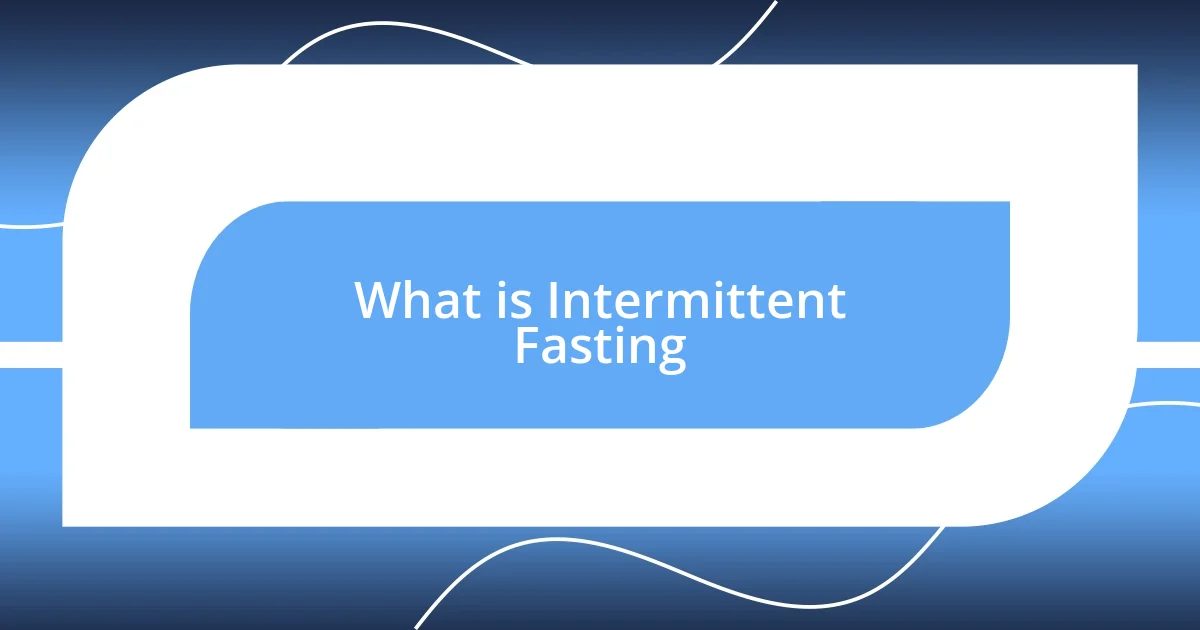
What is Intermittent Fasting
Intermittent fasting is more than just skipping meals; it’s a structured approach to eating that cycles between periods of eating and fasting. I remember the first time I tried it—I felt a mix of excitement and uncertainty, wondering if it would really work for me. Would I struggle with hunger, or would I find a new rhythm in my day?
This eating pattern can vary significantly, ranging from the popular 16/8 method, where I fast for 16 hours and eat during an 8-hour window, to the more extreme alternate-day fasting. I often found myself marvelling at how my body adapted; the hunger pangs that initially felt overwhelming gradually turned into a sense of clarity and focus that I hadn’t experienced before. It was almost as if my body was thanking me for the break from constant snacking.
At its core, intermittent fasting can be viewed as a way to reset our relationship with food. I’ve often asked myself: How did we get so accustomed to eating all day long? This method not only helped me shed some unwanted pounds but also encouraged me to reflect on when and why I was eating, rather than just what I was eating.
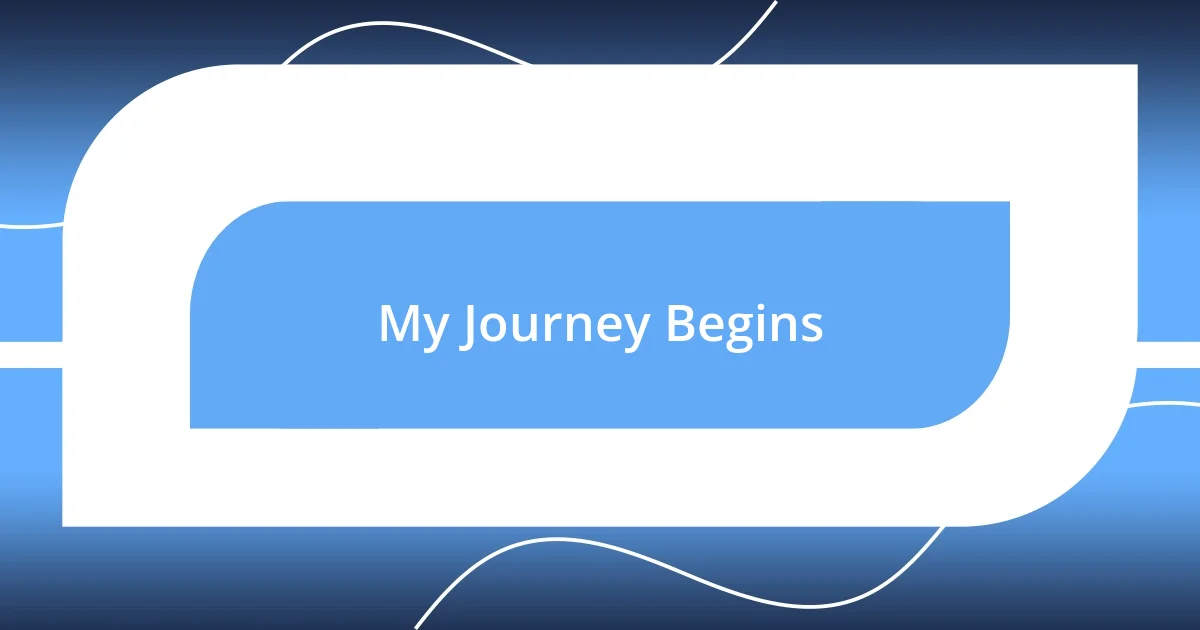
My Journey Begins
I still vividly remember the day I decided to embark on my intermittent fasting journey. I was sitting in my kitchen, a pile of snacks surrounding me, feeling sluggish and overwhelmed by my eating habits. With a sense of determination, I marked my first fasting window on the calendar. This was not just about losing weight; it felt like a fresh start, an opportunity to reclaim control over my health.
As the initial fasting hours ticked by, I discovered an unexpected calmness. Initially, I was a bit anxious, worried that I’d be battling insatiable cravings. Instead, I found myself engaging in activities I had previously neglected, like reading and going for walks. Those moments of distraction helped me realize that food was often just a response to boredom or stress—transforming my perspective on hunger.
With each passing day, I started to appreciate the simplicity in this new routine. I began to cherish the meals I did eat, savoring every bite instead of mindlessly munching. This shift in mindset opened my eyes to the joy of cooking and nourishing my body in a thoughtful way. It was less about deprivation and more about choosing to enjoy food when I truly wanted it.
| Aspect | My Initial Experience |
|---|---|
| Mindset | Excited yet anxious |
| First Meal After Fasting | Felt like a celebration |
| Hunger Levels | Gradually became manageable |
| Activities During Fasting | Reading, walking, reflecting |
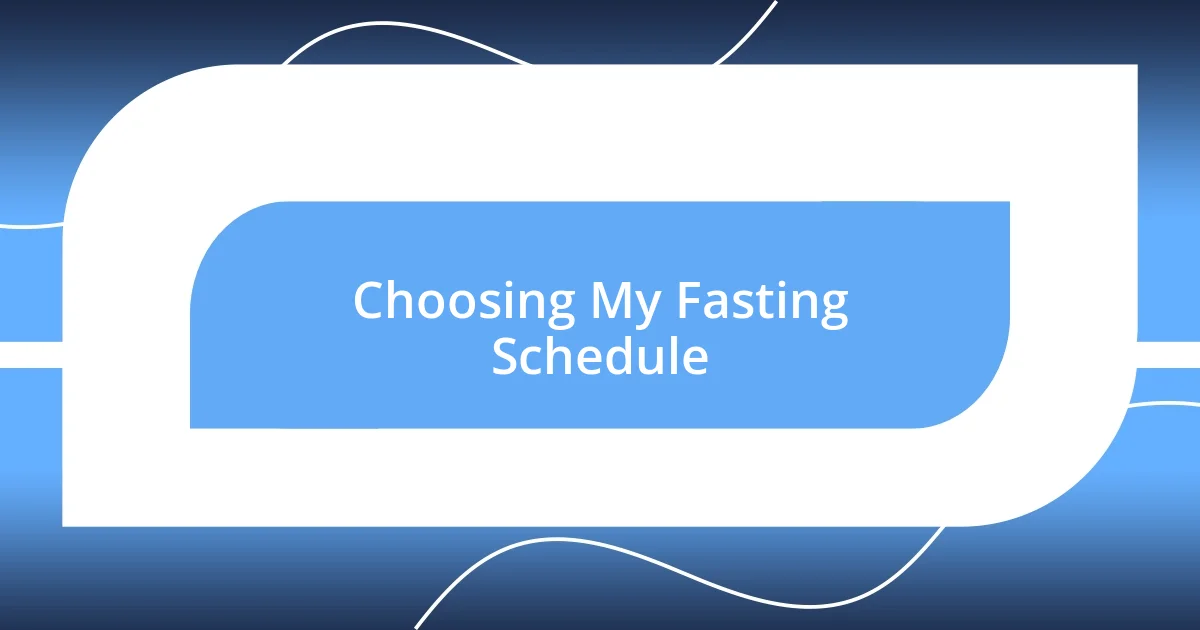
Choosing My Fasting Schedule
Choosing the right fasting schedule was pivotal for me. I needed to honor my body’s natural rhythm while accommodating my daily responsibilities. After some trial and error, I found that starting my fast after dinner felt most intuitive—calming down for the night without the temptation of late-night snacking was a game-changer.
To figure out what worked best for me, I considered several factors:
- Daily Routine: I aligned my fasting windows with my work schedule, ensuring I wasn’t starving during busy periods.
- Social Obligations: I tried to adjust my eating window to accommodate family dinners and friend gatherings; it made the transition smoother.
- Hunger Cues: I paid attention to my body’s signals, fasting when I felt naturally less hungry, rather than strictly adhering to a clock.
- Energy Levels: Fasting during hours when I generally felt sluggish made it easier to stick with the plan; I soon learned how to harness that newfound energy.
Listening to my body was key. I remember days when I wanted to break my fast earlier than planned, and those moments taught me to stay flexible. Adapting to my own needs fostered a sense of empowerment that I hadn’t anticipated, turning fasting from a daunting task into a thoughtful practice. It was like learning a new language—challenging but ultimately rewarding, guiding me toward a healthier lifestyle.
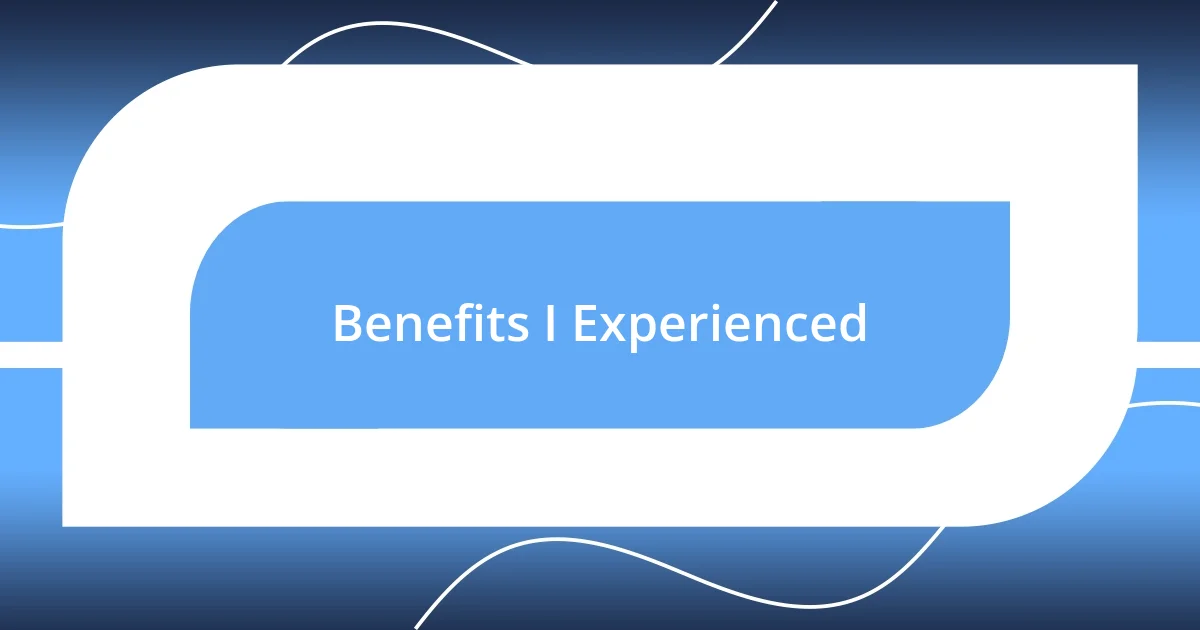
Benefits I Experienced
One of the most significant benefits I experienced with intermittent fasting was the noticeable boost in my mental clarity. I still remember the first few hours of my fasting window when that familiar brain fog lifted, almost as if someone turned on the lights. Have you ever felt that rush of focus when all distractions fade away? For me, it was nothing short of exhilarating. I found myself breezing through tasks that previously felt overwhelming.
Another surprising benefit was the enhancement of my relationship with food. I developed a deeper appreciation for the flavors and textures of what I ate. I can’t tell you how many times I paused mid-meal, letting what I was tasting sink in, rather than just shoveling it down. It’s incredible how food can transform from a routine necessity into a moment of pure enjoyment. Was I really savoring my meals before? This new awareness brought about a joy I didn’t fully realize I was missing.
In terms of physical health, I noticed some improvements in my energy levels and even some changes in my body composition. After a month or so, I felt lighter—not just in weight, but in spirit. I couldn’t help but smile at how much more active I became, enjoying spontaneous hikes or late-night dance sessions in my living room. Have you experienced that surge of energy and motivation that drives you to move? It’s a refreshing reminder that sometimes, the benefits of a lifestyle change go far beyond just the scale.
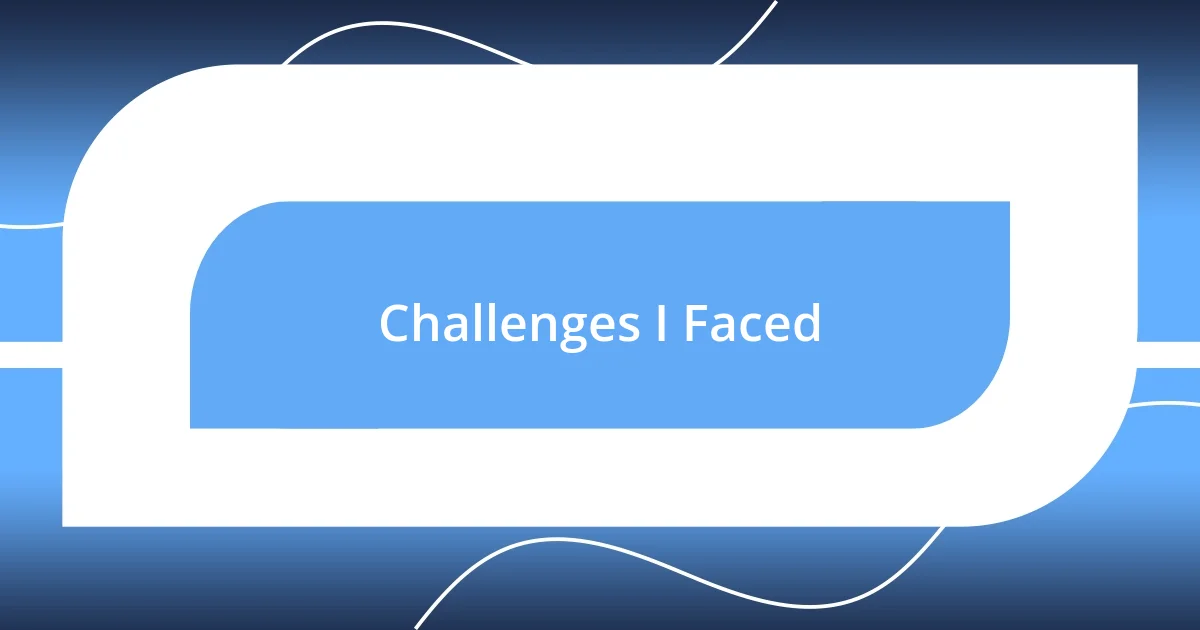
Challenges I Faced
Adjusting to intermittent fasting was not without its hurdles. I found myself struggling with hunger pangs, especially during the first week. Have you ever felt that gnawing sensation in your stomach, making it seem as if the hours were dragging on eternally? I vividly remember pacing around the kitchen, staring longingly at my favorite snacks, reminding myself of the commitment I made. It was tough, but each moment of self-restraint built my mental resilience.
Another challenge arose during social situations. I encountered friction when friends invited me out for dinner, and I was in the middle of my fasting window. How do you navigate that awkward conversation when you’re trying to stick to your commitment but don’t want to seem anti-social? I remember one particular evening when I showed up at a friend’s place, savoring the aroma of freshly baked pizza while sitting with my water bottle. It was a test of willpower, but I learned to communicate my choices more confidently. Honoring my health while socializing became a balancing act that required practice.
Lastly, sleep sometimes suffered as I adjusted my eating patterns. I noticed that my energy levels peaked at odd hours, making it challenging to settle down at night. Ever felt that burst of energy at the wrong time? I found myself lying awake, my mind racing with ideas. As I refined my fasting schedule, I realized the importance of rhythm—not just with my meals, but in my daily life. I began to prioritize calming evening routines to counteract that nighttime restlessness. Each challenge, in hindsight, was a stepping stone toward a more mindful and empowered approach to my health.
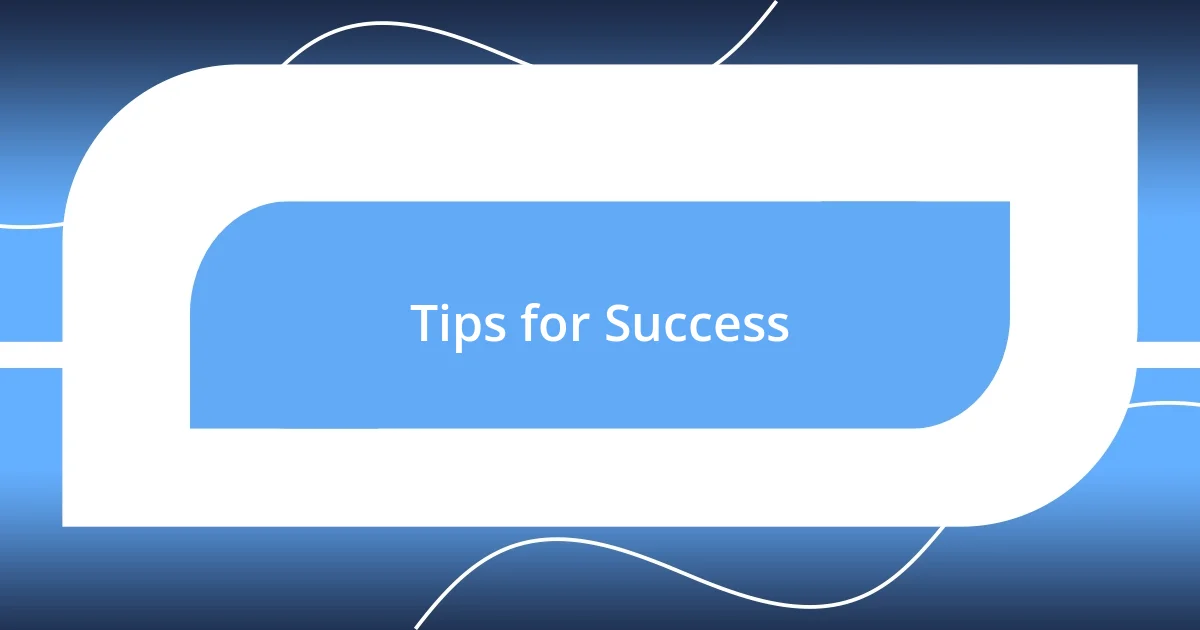
Tips for Success
Staying hydrated was a game-changer for me. I discovered that drinking plenty of water during my fasting hours not only kept hunger at bay but also helped me avoid headaches. Have you ever felt your concentration dip due to dehydration? I learned to keep a water bottle by my side, treating it as my new best friend. It was fascinating how something so simple could make a significant impact on my fasting experience.
Planning my meals became an essential part of my success. I found that having healthy options ready for my eating window made all the difference. One time, I prepped a batch of roasted vegetables and quinoa, and it felt like a victory knowing I had delicious meals waiting for me. The anticipation of enjoying my food, rather than scrambling for something unhealthy, brought a sense of excitement to my fasting routine. Isn’t it amazing how a little preparation can turn a daunting task into a delightful experience?
Lastly, cultivating a supportive environment turned out to be vital. I shared my fasting journey with family and friends, which created understanding and encouragement. I still remember the day my partner decided to join me for dinner during my eating window. That small gesture made me feel less isolated in my choices. Have you ever felt how much easier it is to stay committed when you have someone cheering you on? This camaraderie, I found, not only reinforced my resolve but also made my fasting journey feel more like a shared adventure than a solo mission.
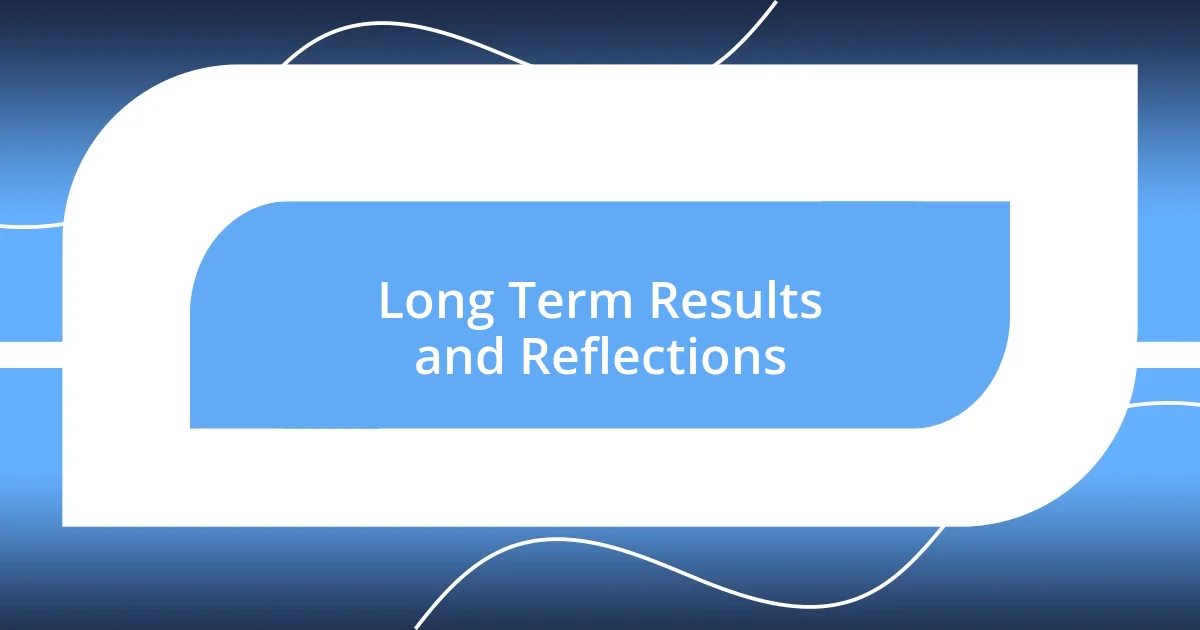
Long Term Results and Reflections
Reflecting on the long-term results of my intermittent fasting journey, I noticed changes that extended beyond just physical aspects. I discovered a profound sense of discipline blossoming inside me. Did you ever take a moment to realize how discipline can seep into other areas of life? For instance, my ability to adhere to fasting windows had an unexpected positive impact on my productivity at work. I felt more focused and energized during those fasting hours, which surprisingly spilled over into my professional performance.
Over time, I also became acutely aware of how my relationship with food evolved. Initially, I viewed meals as strict timeframes to refuel, yet gradually, they transformed into moments of mindful enjoyment. I can remember sitting down to enjoy a meal, savoring each bite instead of rushing through it. Isn’t it amazing how changing the way we eat can shift our entire perspective on food? This newfound appreciation made me more selective about what I consumed, leading me to crave healthier options instinctively.
Lastly, I can’t ignore the emotional rollercoaster that accompanied this journey. While there were triumphant moments, like fitting into old clothes, there were also instances of frustration when results stalled. Have you ever felt that sinking feeling when your efforts don’t seem to match up to your expectations? Through it all, I learned to embrace the process, acknowledging that growth often happens beneath the surface. Each setback became a lesson, shaping my approach and allowing me to develop a more compassionate view of myself. The reflections on my long-term experience with intermittent fasting have truly been a mix of challenge and empowerment.



